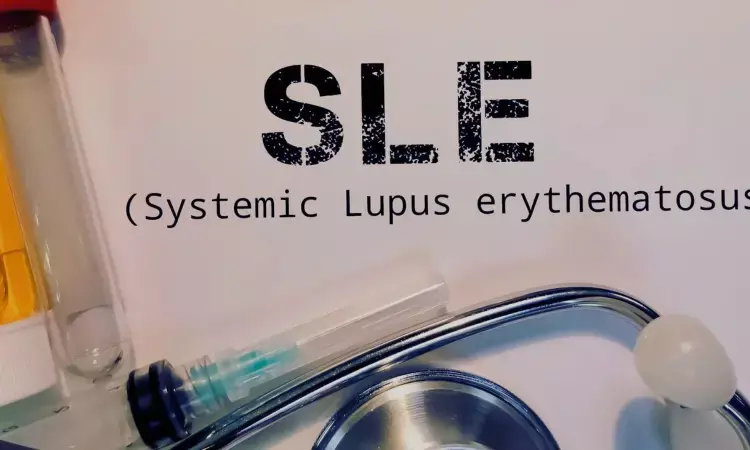- Home
- Medical news & Guidelines
- Anesthesiology
- Cardiology and CTVS
- Critical Care
- Dentistry
- Dermatology
- Diabetes and Endocrinology
- ENT
- Gastroenterology
- Medicine
- Nephrology
- Neurology
- Obstretics-Gynaecology
- Oncology
- Ophthalmology
- Orthopaedics
- Pediatrics-Neonatology
- Psychiatry
- Pulmonology
- Radiology
- Surgery
- Urology
- Laboratory Medicine
- Diet
- Nursing
- Paramedical
- Physiotherapy
- Health news
- Fact Check
- Bone Health Fact Check
- Brain Health Fact Check
- Cancer Related Fact Check
- Child Care Fact Check
- Dental and oral health fact check
- Diabetes and metabolic health fact check
- Diet and Nutrition Fact Check
- Eye and ENT Care Fact Check
- Fitness fact check
- Gut health fact check
- Heart health fact check
- Kidney health fact check
- Medical education fact check
- Men's health fact check
- Respiratory fact check
- Skin and hair care fact check
- Vaccine and Immunization fact check
- Women's health fact check
- AYUSH
- State News
- Andaman and Nicobar Islands
- Andhra Pradesh
- Arunachal Pradesh
- Assam
- Bihar
- Chandigarh
- Chattisgarh
- Dadra and Nagar Haveli
- Daman and Diu
- Delhi
- Goa
- Gujarat
- Haryana
- Himachal Pradesh
- Jammu & Kashmir
- Jharkhand
- Karnataka
- Kerala
- Ladakh
- Lakshadweep
- Madhya Pradesh
- Maharashtra
- Manipur
- Meghalaya
- Mizoram
- Nagaland
- Odisha
- Puducherry
- Punjab
- Rajasthan
- Sikkim
- Tamil Nadu
- Telangana
- Tripura
- Uttar Pradesh
- Uttrakhand
- West Bengal
- Medical Education
- Industry
Use of elderberry as herbal supplement may exacerbate dermatomyositis and cutaneous lupus erythematosus: Study

Researchers found that among those patients affected by autoimmune skin diseases such as dermatomyositis (DM) and cutaneous lupus erythematosus (CLE), the use of herbal supplements is widespread. A recent study, performed in the rheumatologic-dermatology clinic at the University of Pennsylvania, highlights the need to enhance patient and provider education regarding the risks of herbal supplements in autoimmune disorders. The study was published in ACR Open Rheumatology by Daniella and colleagues.
In recent studies, there is a growing trend to undergo herbal remedies; patients have gradually accepted alternate or additive therapies for chronic diseases. However, some supplements can stimulate the immune system, which may worsen the condition by causing immunological derangement. The present study focused on the use of herbal supplements in autoimmune skin disease and aspires to define some patterns and risk involved in them.
A retrospective analysis was conducted on the cohort of 673 adult patients with validated cases of dermatomyositis or cutaneous lupus erythematosus treated at the University of Pennsylvania's rheumatologic-dermatology clinic between January 2007 and February 2024. Data collected include demographic data, as well as those regarding disease characteristics, and detailed data regarding herbal supplement use. Predictors of supplement treatment were evaluated through chi-square tests, and results are reported in odds ratios to outline significant patterns and risks.
Key Findings
• 32% of patients reported using herbal supplements. Patterns of use were associated with marked variability based on age and ethnicity:
• 44% of patients aged 18–29 years used herbal supplements, compared to 29% of patients aged 50–64 years (P = 0.02) and 23% of patients aged 65 years and older (P = 0.003).
• Herbal supplement use was significantly more common among Hispanic/Latino patients at 58% compared with White patients at 31%, P = 0.009.
• Sex and race did not differ in supplement use (33% of women patients vs 29% of men patients, P = 0.49) or race (31% of Whites, 31% of African Americans, P = 1.0; 38% of Asians, P = 0.55). No differences occurred between patients with DM (30%) and those with CLE (36%, P = 0.12).
However, the study did reveal some important information regarding the risk of herbal supplements.
• Among DM patients, 31% reported onset or worsening of disease after initiation of herbal therapy, compared with 10% of CLE patients.
• Among these herbal supplements, elderberry appears to be the most commonly linked with exacerbation in both DM and CLE patients, with symptoms worsening in 62% of DM and 50% of CLE.
In conclusion, the prevalence of supplement use was high in autoimmune skin disease patients. Of these supplements, elderberry posed the greatest risk to patients' conditions, particularly for dermatomyositis sufferers. Healthcare providers need to be vigilant in terms of screening and advising patients against using risky supplements so that patients are protected from immune dysregulation and worsening of conditions.
Reference:
Faden, D. F., Stone, C. J., Xie, L., Lopes Almeida Gomes, L., & Werth, V. P. (2024). Prevalence and risk of immunostimulatory herbal supplement treatment among autoimmune dermatology patients. ACR Open Rheumatology. https://doi.org/10.1002/acr2.11735
Dr Riya Dave has completed dentistry from Gujarat University in 2022. She is a dentist and accomplished medical and scientific writer known for her commitment to bridging the gap between clinical expertise and accessible healthcare information. She has been actively involved in writing blogs related to health and wellness.
Dr Kamal Kant Kohli-MBBS, DTCD- a chest specialist with more than 30 years of practice and a flair for writing clinical articles, Dr Kamal Kant Kohli joined Medical Dialogues as a Chief Editor of Medical News. Besides writing articles, as an editor, he proofreads and verifies all the medical content published on Medical Dialogues including those coming from journals, studies,medical conferences,guidelines etc. Email: drkohli@medicaldialogues.in. Contact no. 011-43720751


